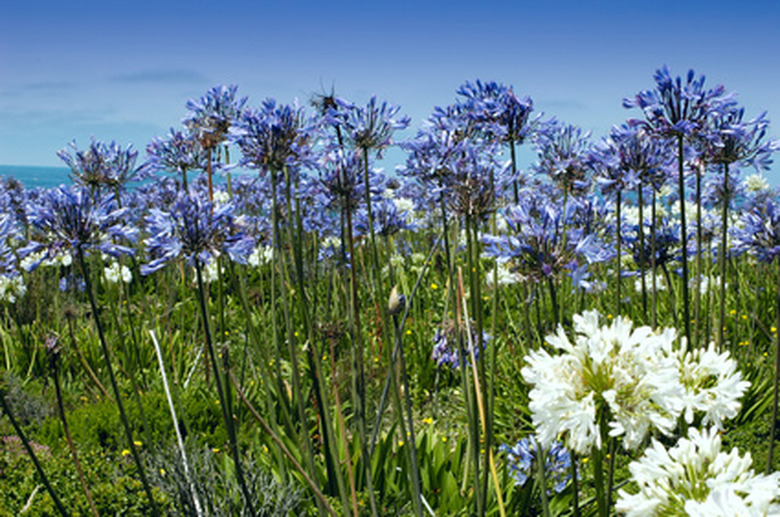Diseases Of Agapanthus
Agapanthus, also commonly known as Nile Lily or LiIy of the Nile, is a species of flowering perennial related to the Amaryllis family. Native to the southern portion of the African continent, agapanthus grows up from underground rhizomes producing tall tensile green stalks. The strappy foliage is low growing and mounds in a fountain-like form. Agapanthus thrives in full sun and does not tolerate frost or freezing temperatures. While it is generally considered to be disease resistant, a few common problems including some characteristic of rhizomatic plants can crop up.
Botrytis Blight
Also known as gray mold, Botrytis is a common fungal disease and can infect much of the agapanthus plant, except the root system. Pale gray or silvery spots and coatings will develop on tissues during prolonged wet or humid conditions with little to no sun, but will be dusty and easily airborne when dry. The infected plant tissues below the gray coating turn yellow, then brown and die. Tissue that has been killed and is brown can be dotted with the fungal spores that have turned black by the late summer or early fall. There is no cure and infected tissues should be removed and discarded and never composted which can risk spreading the pathogen.
- Agapanthus, also commonly known as Nile Lily or LiIy of the Nile, is a species of flowering perennial related to the Amaryllis family.
- Also known as gray mold, Botrytis is a common fungal disease and can infect much of the agapanthus plant, except the root system.
Rhizome and Root Rot
Caused by the Fusarium, Rhizoctonia or Pythium fungi, rhizome and root rot are soil borne diseases that persist in the soil for several years. Underground agapanthus tissues can be infected and young plants are particularly susceptible to being killed. The rot manifest as spots of liquifying rot that look they are water or oil soaked, and sometimes accompanied by white mold. The top foliage can be stunted in growth and wilted and the lower leaves or stems can show signs of a brown slimy rot in splotches as well. These fungi are most active in wet soil with poor drainage and poor ambient air flow. Plants can be strengthened to encourage them to outgrow the damage with appropriate irrigation and fertilizer, but there is no eradicating cure for the fungus.
Leaf Spot
Leaf spot is caused by the Colletotrichum and Myrothecium fungi that are activated by moisture that persists on the leaves. Leaf spot can darken and pit agapanthus leaves with yellow, brown and even black spots and spread to kill the leaf in serious cases. The lesions start on the top side of foliage, but can penetrate through the leaf with just a thin layer of dead tissue remaining between the top and bottom of the leaf surfaces. The prevalence of leaf spot can be managed by keeping the leaves dry during watering, planting in locations with morning sun, removing heavily infected plant material and using resistant cultivars if you live in wet or humid climates. Spray fungicides can also be used to keep down an infection and limit its damage but cannot completely eradicate the spores.
- Caused by the Fusarium, Rhizoctonia or Pythium fungi, rhizome and root rot are soil borne diseases that persist in the soil for several years.
- The rot manifest as spots of liquifying rot that look they are water or oil soaked, and sometimes accompanied by white mold.
